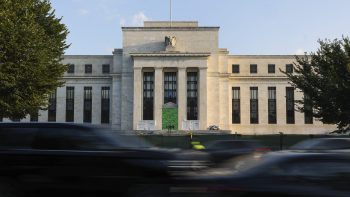Unused cash piling up at the Fed
TEXT OF STORY
Kai Ryssdal: When banks don’t lend, one side effect is that hundreds of billions of dollars in cash accumulates unused at the Federal Reserve. Those reserve balances as they are known have hit historic highs in the past few weeks. And today the Fed announced its stash of unused cash has gotten even bigger despite the bailouts. From Washington, Marketplace’s Steve Henn reports.
Steve Henn: To give you a sense of how big this credit crunch is, just think back to the World Trade Center attacks. They tore a hole in global financial markets.
Right after the attacks, the reserve balances at the Fed started accumulating virtually overnight, says James Hamilton, an economist at the University of California. Reserves rose from just a few billion to $67 billion.
James Hamilton: Because of the terrific shock to the infrastructure the reserves would just pile up. There wasn’t a functioning market to lend them between banks.
But the breakdown in lending this month was even bigger. Last week, commercial banks parked more than $175 billion in unused cash in their Fed accounts.
Hamilton: Which is almost 3 times, 2.5 times the size of that huge disruption that came in September of 2001.
After the shocks of September 11th, it took just a couple weeks for the financial system to return to normal, and for banks to begin lending to each other again. In this crisis that’s not happening. This week the pile of unused cash sitting in Fed accounts shot up $90 billion to $265 billion, according to the Fed. Hamilton says that’s a sign that credit markets are still frozen.
But Doug Diamond at the University of Chicago’s graduate school of business says it’s no cause for alarm. He believes that once the bailouts are in place they should work, but it will take some time for confidence to return and for banks to stop hoarding their money.
Doug Diamond: I’d say it will take in the range of a month from now.
In the meantime, Diamond says, the Fed has begun to pay interest on those deposits.
In Washington I’m Steve Henn for Marketplace.
There’s a lot happening in the world. Through it all, Marketplace is here for you.
You rely on Marketplace to break down the world’s events and tell you how it affects you in a fact-based, approachable way. We rely on your financial support to keep making that possible.
Your donation today powers the independent journalism that you rely on. For just $5/month, you can help sustain Marketplace so we can keep reporting on the things that matter to you.


















